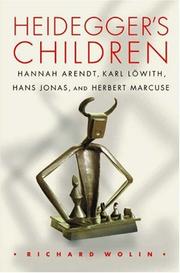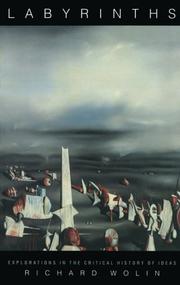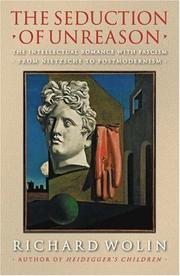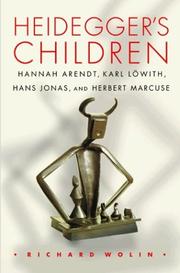| Listing 1 - 10 of 31 | << page >> |
Sort by
|
Book
Abstract | Keywords | Export | Availability | Bookmark
 Loading...
Loading...Choose an application
- Reference Manager
- EndNote
- RefWorks (Direct export to RefWorks)
Book
Abstract | Keywords | Export | Availability | Bookmark
 Loading...
Loading...Choose an application
- Reference Manager
- EndNote
- RefWorks (Direct export to RefWorks)
Book
ISBN: 023105422X 0231054238 Year: 1982 Publisher: New York (N.Y.): Columbia university press
Abstract | Keywords | Export | Availability | Bookmark
 Loading...
Loading...Choose an application
- Reference Manager
- EndNote
- RefWorks (Direct export to RefWorks)
Benjamin, Walter --- -Benjamin, W. --- Criticism and interpretation --- -Criticism and interpretation --- Benjamin, Walter, --- Benjamin, W. --- Criticism and interpretation. --- Holz, Detlef, --- Banyaming, --- Benʼyamin, Varutā, --- Peñcamin̲, Vālṭṭar, --- Binyamin, Ṿalṭer, --- בנימין, ולטר --- בנימין, ולטר, --- ולטר, בנימין, --- Penyamin, Palt'ŏ, --- 벤야민 발터,

ISBN: 0691070199 Year: 2001 Publisher: Princeton, N.J. Princeton University Press
Abstract | Keywords | Export | Availability | Bookmark
 Loading...
Loading...Choose an application
- Reference Manager
- EndNote
- RefWorks (Direct export to RefWorks)
Löwith, Karl --- Heidegger, Martin --- Jonas, Hans --- Marcuse, Herbert --- Arendt, Hannah --- Jewish philosophers --- -Philosophers, Jewish --- Philosophers --- History --- -Heidegger, Martin --- -Influence --- -History --- Philosophers, Jewish --- Influence. --- Khaĭdegger, Martin, --- Haĭdegger, Martin, --- Hīdajar, Mārtin, --- Hai-te-ko, --- Haidegŏ, --- Chaitenger, Martinos, --- Chaitenker, Martinos, --- Chaintenger, Martin, --- Khaĭdeger, Martin, --- Hai-te-ko-erh, --- Haideger, Marṭinn, --- Heidegger, M. --- Haideger, Martin, --- Hajdeger, Martin, --- הייגדר, מרתין --- היידגר, מרטין --- היידגר, מרטין, --- 海德格尔, --- Chaintenker, Martin, --- Hāydigir, Mārtīn, --- Hīdigir, Mārtīn, --- هاىدگر, مارتين, --- هىدگر, مارتين,
Book
ISBN: 9045010852 Year: 2003 Publisher: Amsterdam Atlas
Abstract | Keywords | Export | Availability | Bookmark
 Loading...
Loading...Choose an application
- Reference Manager
- EndNote
- RefWorks (Direct export to RefWorks)
Löwith, Karl --- Heidegger, Martin --- Jonas, Hans --- Marcuse, Herbert --- Arendt, Hannah --- Filosofie --- Nazisme --- Philosophie
Book
ISBN: 2908212374 9782908212372 Year: 1992 Volume: *2 Publisher: Paris Kimé
Abstract | Keywords | Export | Availability | Bookmark
 Loading...
Loading...Choose an application
- Reference Manager
- EndNote
- RefWorks (Direct export to RefWorks)
Political philosophy. Social philosophy --- Heidegger, Martin --- Existence [Philosophie de l' ] --- Existentialism --- Existentialisme --- Existentiefilosofie --- Existenzphilosophie --- Nationaal-socialisme --- National socialism --- National-socialisme --- Nazism --- Nazisme --- Philosophie de l'existence --- Heidegger, Martin (1889-1976) --- Philosophie politique --- --1817 --- Heidegger, Martin, --- --Political philosophy. Social philosophy --- Political and social views --- Philosophy [Modern ] --- 20th century --- Philosophy [German ] --- --Heidegger, Martin --- Heidegger, Martin, 1889-1976

ISBN: 0231073143 9780231073141 Year: 1990 Publisher: New York Columbia University Press
Abstract | Keywords | Export | Availability | Bookmark
 Loading...
Loading...Choose an application
- Reference Manager
- EndNote
- RefWorks (Direct export to RefWorks)
Existence [Philosophie de l' ] --- Existentialism --- Existentialisme --- Existentiefilosofie --- Existenzphilosophie --- Nationaal-socialisme --- National socialism --- National-socialisme --- Nazism --- Nazisme --- Philosophie de l'existence --- National socialism. --- Philosophy, Modern --- Philosophy, German --- Existentialism. --- -Philosophy, Modern --- -Modern philosophy --- German philosophy --- Ontology --- Phenomenology --- Epiphanism --- Relationism --- Self --- Authoritarianism --- Fascism --- Nazis --- Neo-Nazism --- Totalitarianism --- World War, 1939-1945 --- Causes --- Heidegger, Martin --- -Political and social views --- -Heidegger, Martin --- -Existenzphilosophie --- Modern philosophy --- Heidegger, Martin, --- Political and social views. --- Political and social views --- Philosophy [Modern ] --- 20th century --- Philosophy [German ] --- Heidegger, Martin, 1889-1976 - Political and social views. --- Philosophy, Modern - 20th century. --- Philosophy, German - 20th century. --- Khaĭdegger, Martin, --- Haĭdegger, Martin, --- Hīdajar, Mārtin, --- Hai-te-ko, --- Haidegŏ, --- Chaitenger, Martinos, --- Chaitenker, Martinos, --- Chaintenger, Martin, --- Khaĭdeger, Martin, --- Hai-te-ko-erh, --- Haideger, Marṭinn, --- Heidegger, M. --- Haideger, Martin, --- Hajdeger, Martin, --- הייגדר, מרתין --- היידגר, מרטין --- היידגר, מרטין, --- 海德格尔, --- Chaintenker, Martin, --- Hāydigir, Mārtīn, --- Hīdigir, Mārtīn, --- هاىدگر, مارتين, --- هىدگر, مارتين,

ISBN: 0870239902 0585084289 9780585084282 0870239899 9780870239892 9780870239908 1122054246 9781122054249 Year: 1995 Volume: *1 Publisher: Amherst University of Massachusetts Press
Abstract | Keywords | Export | Availability | Bookmark
 Loading...
Loading...Choose an application
- Reference Manager
- EndNote
- RefWorks (Direct export to RefWorks)
Philosophy, French --- Philosophy, German --- Philosophy [German ] --- 20th century --- Philosophy [French ] --- Germany --- Intellectual life --- France --- Heidegger, Martin --- Influence

ISBN: 0691114641 0691125996 9786612157929 1282157922 1400825962 Year: 2009 Publisher: Princeton, NJ : Princeton University Press,
Abstract | Keywords | Export | Availability | Bookmark
 Loading...
Loading...Choose an application
- Reference Manager
- EndNote
- RefWorks (Direct export to RefWorks)
Fifteen years ago, revelations about the political misdeeds of Martin Heidegger and Paul de Man sent shock waves throughout European and North American intellectual circles. Ever since, postmodernism has been haunted by the specter of a compromised past. In this intellectual genealogy of the postmodern spirit, Richard Wolin shows that postmodernism's infatuation with fascism has been widespread and not incidental. He calls into question postmodernism's claim to have inherited the mantle of the left--and suggests that postmodern thought has long been smitten with the opposite end of the political spectrum. In probing chapters on C. G. Jung, Hans-Georg Gadamer, Georges Bataille, and Maurice Blanchot, Wolin discovers an unsettling commonality: during the 1930's, these thinkers leaned to the right and were tainted by a proverbial "fascination with fascism." Frustrated by democracy's shortcomings, they were seduced by fascism's grandiose promises of political regeneration. The dictatorships in Italy and Germany promised redemption from the uncertainties of political liberalism. But, from the beginning, there could be no doubting their brutal methods of racism, violence, and imperial conquest. Postmodernism's origins among the profascist literati of the 1930's reveal a dark political patrimony. The unspoken affinities between Counter-Enlightenment and postmodernism constitute the guiding thread of Wolin's suggestive narrative. In their mutual hostility toward reason and democracy, postmodernists and the advocates of Counter-Enlightenment betray a telltale strategic alliance--they cohabit the fraught terrain where far left and far right intersect. Those who take Wolin's conclusions to heart will never view the history of modern thought in quite the same way.
Extreem rechts --- Extrême droite --- Fascism --- Fascisme --- Ideologie --- Ideology --- Idéologie --- Neo-fascism --- Néonazisme --- Uiterst rechts --- Uiterst-rechts --- Fascism. --- Political science --- Ideology. --- Philosophy. --- Political philosophy --- Knowledge, Theory of --- Philosophy --- Psychology --- Thought and thinking --- Authoritarianism --- Collectivism --- Corporate state --- National socialism --- Synarchism --- Totalitarianism

ISBN: 069111479X 9780691114798 Year: 2003 Publisher: Princeton Oxford Princeton University Press
Abstract | Keywords | Export | Availability | Bookmark
 Loading...
Loading...Choose an application
- Reference Manager
- EndNote
- RefWorks (Direct export to RefWorks)
Martin Heidegger is perhaps the twentieth century's greatest philosopher, and his work stimulated much that is original and compelling in modern thought. A seductive classroom presence, he attracted Germany's brightest young intellects during the 1920s. Many were Jews, who ultimately would have to reconcile their philosophical and, often, personal commitments to Heidegger with his nefarious political views. In 1933, Heidegger cast his lot with National Socialism. He squelched the careers of Jewish students and denounced fellow professors he considered insufficiently radical. For years, he signed letters and opened lectures with "Heil Hitler!" He paid dues to the Nazi party until the bitter end. Equally problematic for his former students were his sordid efforts to make existential thought serviceable to Nazi ends and his failure to ever renounce these actions. This book explores how four of Heidegger's most influential Jewish students came to grips with his Nazi association and how it affected their thinking. Hannah Aredt. who was Heidegger's lover as well as his student, went on to become one of the century's greatest political thinkers. Karl Lowith returned to Germany in 1953 and quickly became one of its leading philosophers. Hans Jonas grew famous as Garmany's premier philosopher of environmentalism. Herbert Marcuse gained celebrity as a Frankfurt School intellectual and mentor to the New Left. Why did these brilliant minds fail to see what was in Heidegger's heart and Germany's future? How would they, after the war, reappraise Germany's intellectual traditions? Could they salvage aspects of Heidegger's thought? Would their philosophy reflect or completely reject their early studies? Could these Heideggerians forgive, or even try to understand, the betrayal of the man they so admired? Heidegger's Children locates these paradoxes in the wider cruel irony that European Jews experienced their greatest calamity immediately following their fullest assimilation. And it finds in their responses answers to questions about the nature of existential disillustionment and the juncture between politics and ideas.
Germany --- Jewish philosophers --- Influence (Literary, artistic, etc.) --- National socialism --- Philosophy --- Heidegger, Martin, --- Jonas, Hans, --- Marcuse, Herbert, --- Löwith, Karl, --- Arendt, Hannah, --- Heidegger, Martin --- Influence --- History --- 20th century --- National socialism - Philosophy --- Heidegger, Martin, - 1889-1976 --- Jonas, Hans, - 1903-1993 --- Marcuse, Herbert, - 1898-1979 --- Löwith, Karl, - 1897-1973 --- Arendt, Hannah, - 1906-1975
| Listing 1 - 10 of 31 | << page >> |
Sort by
|

 Search
Search Feedback
Feedback About UniCat
About UniCat  Help
Help News
News